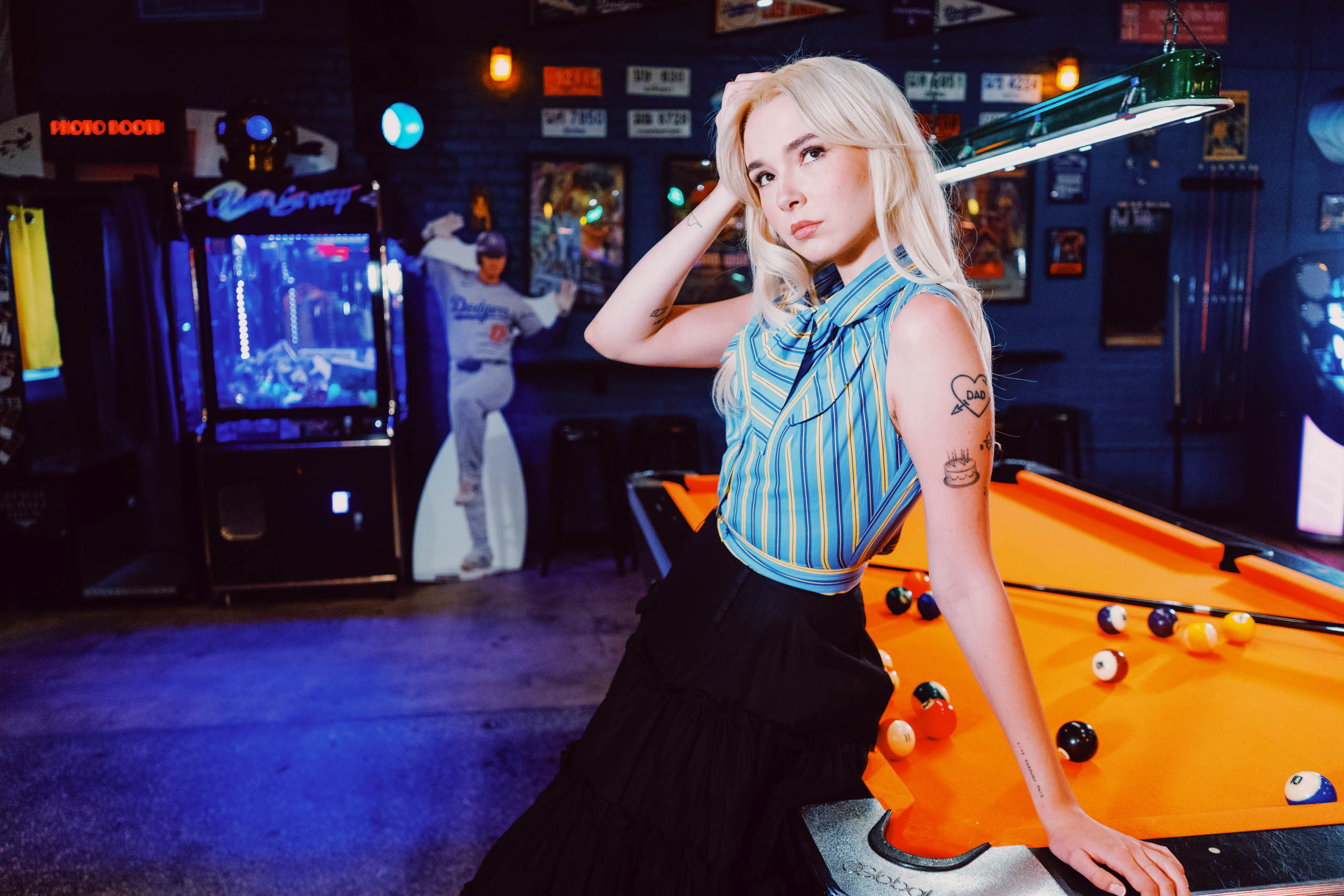“I knew that whatever my solo project was going to be, I wanted to really embrace this full pop idea. I want to take my music as far as it’ll go, because I feel I’ve already experienced so many of the negatives. So I’m prepared. I feel well-trained that if things do blow up and go really well, I have this foundation. I feel like I’ve been in school for it, almost.”
So says Lydia Night, best known as the frontwoman of now-defunct LA teen punk band The Regrettes, as she prepares to unleash her ambitious and attitudinal solo debut, Parody of Pleasure, on which she unapologetically and quite convincingly reinvents herself as a budding pop star (a journey she’s been chronicling via her cheekily titled YouTube series, “Pop or Flop”). Although Night is only 24 years old, she’s been playing in bands for three-quarters of her life, including the proto-Regrettes duo Pretty Little Demons, the youngest group to ever play SXSW (where, at age 12, she caught the attention of Ryan Gosling and was recruited to sing in his gothic-folk collective, Dead Man’s Bones).
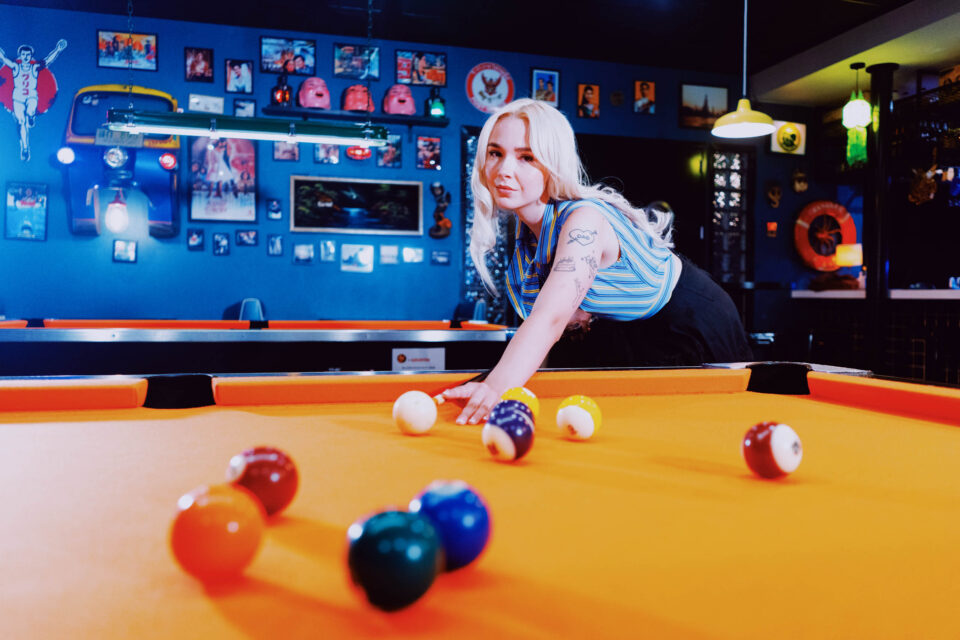
By age 15, Night was fronting The Regrettes, and she admits that finally being on her own and making such a career pivot is “super scary.” But it’s also “super-exciting…especially because it’s scary.” She says she experienced “some grieving” after The Regrettes—who were, foreshadowingly, beginning to lean more pop on their third and final album, Further Joy—called it quits in late 2023. But she knew it was time to move on. “I think a bunch of things built up, some that were interpersonal with my band, some that were just the nature of collaborating that I was kind of sick of. I love collaboration, but being in a band is such a specific art form, and that’s all I’ve ever done. I mean, I started my first band when I was six! I’d never not been in a band.”
While the response to her first three solo singles was “mostly positive, more than I expected,” Night is well aware that some Regrettes diehards won’t understand or appreciate what she’s trying to do on Parody of Pleasure. “I just think it’s funny when people get genuinely angry at an artist making a different choice for themselves,” she shrugs. “It’s like, why would I stick to something that I don’t enjoy creating anymore?” But Night says she never felt fully embraced by the LA punk scene anyway, because The Regrettes were on a major label and “there were rumors that we were ‘nepo babies,’ ‘industry plants,’ all kinds of shit, when none of that was the case.” (Night’s father is filmmaker and former club owner Morgan Higby Night.)
And so, while Night had been a punk fanatic ever since her dad took her to see The Donnas when she was five (or maybe even before that, when she sang a Ramones song at her dad’s nightclub when she was two), as she fully enters her pop era, she’s instead feeling her mother’s musical influence. “I remember my mom playing Britney Spears’ Blackout or Gwen Stefani’s Love. Angel. Music. Baby. and pretending that was me and putting on my arena show in my head,” she laughs. “Those will always be the records I go back to—to feel like a kid again, to feel that sort of freedom and excitement toward performing and doing what I do.”
At first, Night kept her pop aspirations secret. She told her team she was taking a month off after The Regrettes’ farewell shows and began “writing just for fun on my couch” and “making little voice memos” with her then-boyfriend, musician/producer Adam Henderson. Their first collaboration was the sardonically titled hyperbop experiment “Art Sucks,” which eventually became Parody of Pleasure’s closing track. “I was like, ‘Let’s just keep making stuff because I’m on break. No one’s expecting anything from me, and I’m not expecting anything to come from this.’ But once we started writing, once we were on the fourth or fifth song, I was like, ‘Oh shit, I think we’re starting a project now!’” she recalls.
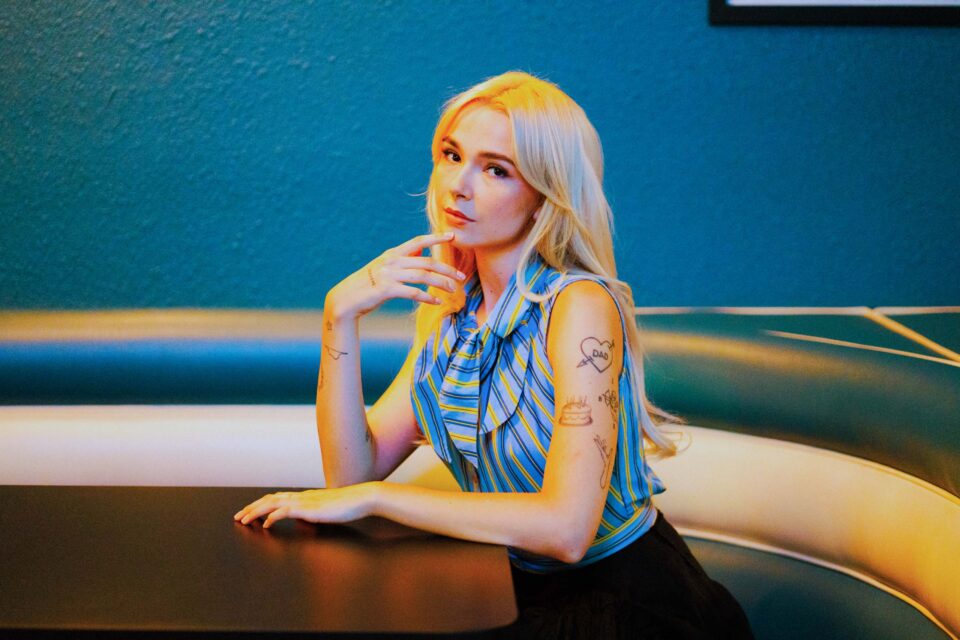
“I love collaboration, but being in a band is such a specific art form, and that’s all I’ve ever done. I mean, I started my first band when I was six! I’d never not been in a band.”
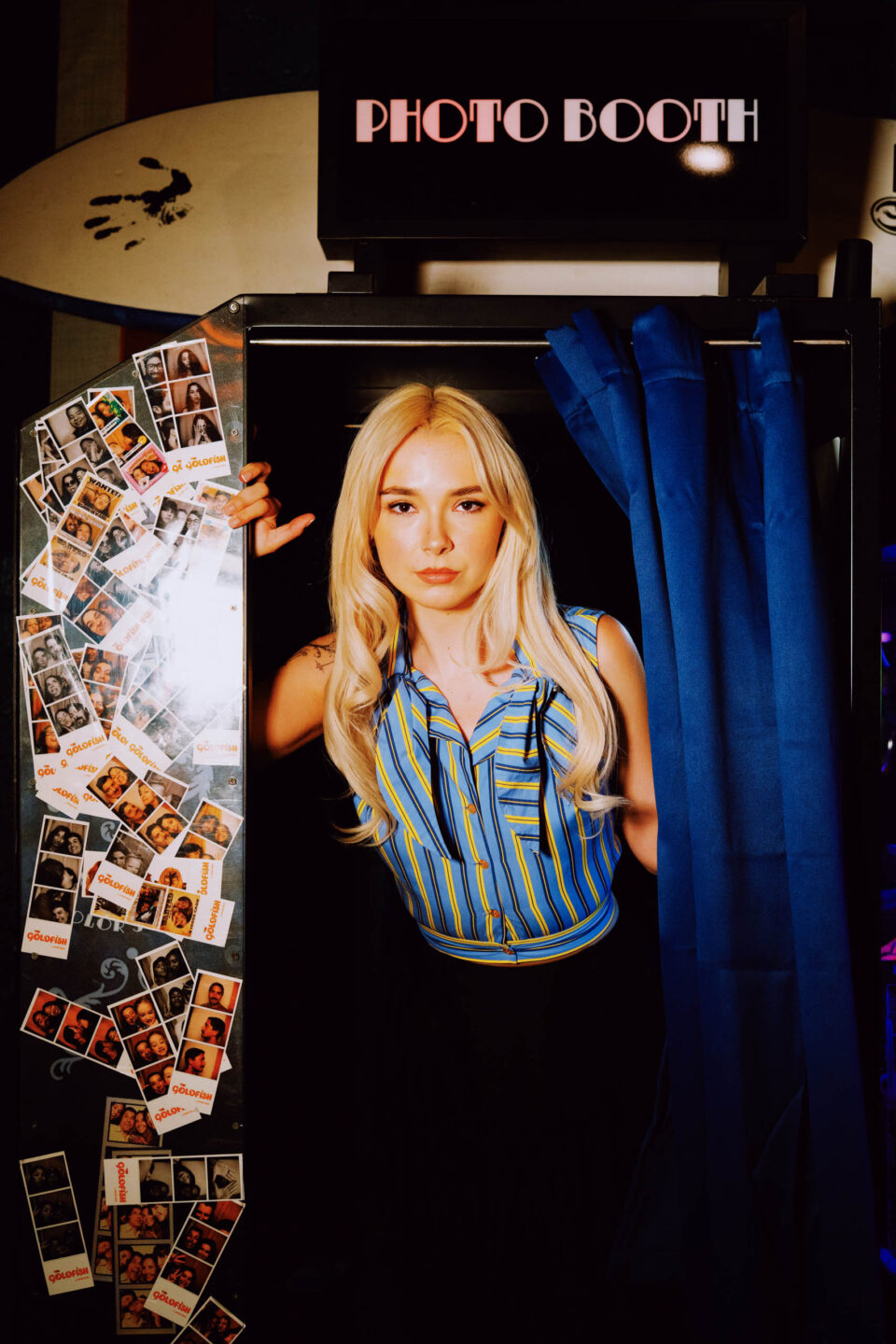
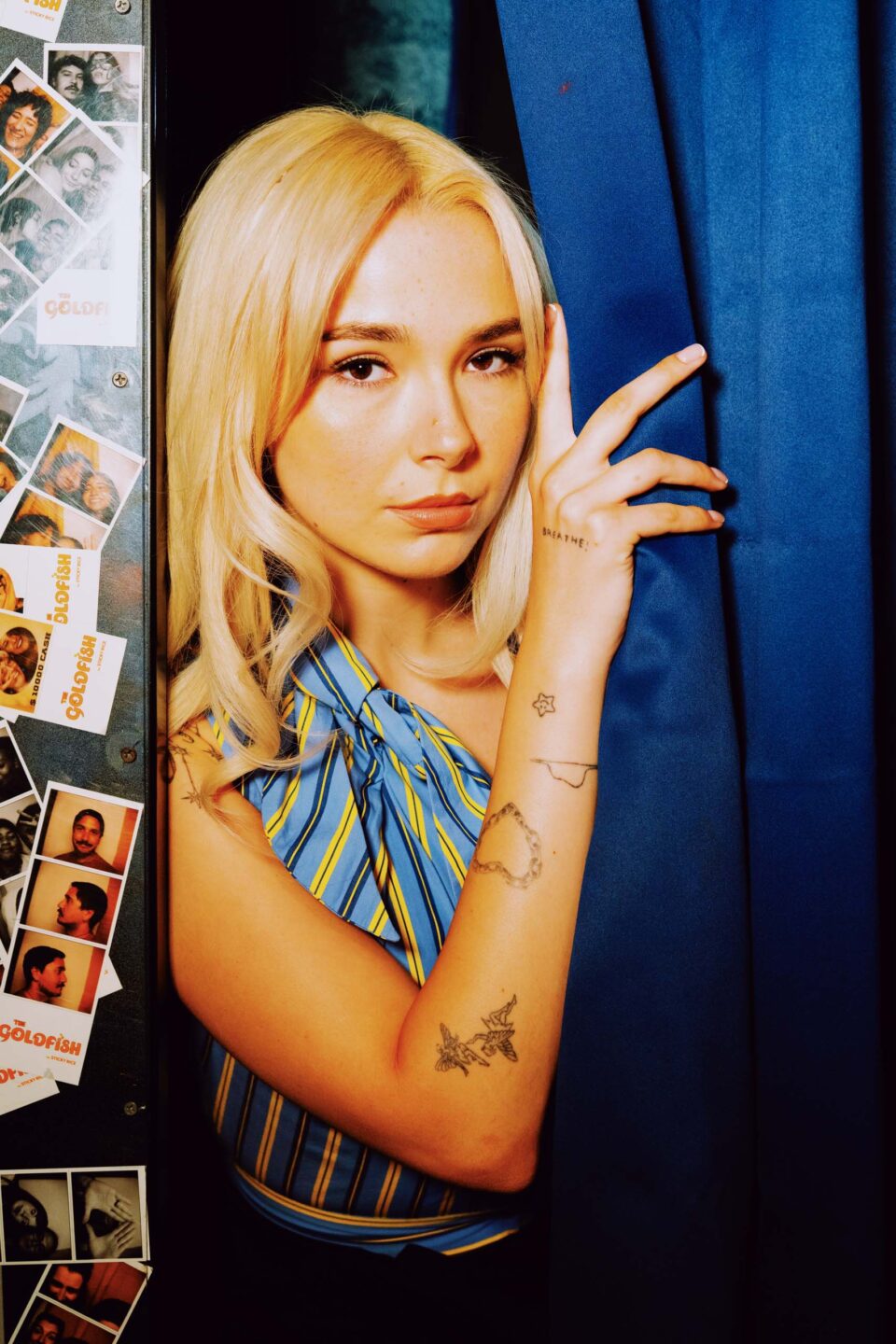
Night was initially hesitant to send any of the tracks to her label or management, but once she did and “everyone was like, ‘Holy shit, we love this direction,’” she “pretty much scrapped what I had been writing the whole year before.” And then, she scrapped her relationship with Henderson, too, and found herself living the single-girl life during one hot and hedonistic New York City summer. There, Night linked up with producer Alexis Kesselman, who records her own music under the name Idarose. The two holed up in Kesselman’s Hell’s Kitchen home studio, and that was when Parody of Pleasure truly took shape.
“It was easy to be vulnerable [with Henderson] because, obviously, we were in a relationship and it was very specific. But when I took it to Alexis, my comfortability—even subconsciously, at first—was just on such a different level,” Night marvels. “Because this is someone who’s shared these experiences in the world and in this industry with sexuality and gender, it was just a totally different game. I never felt unsafe or judged or any disconnect of understanding. I just always felt really understood by her, and I think that that comes with her being a woman. I think women are really perceptive and understanding. It was so awesome, and I can’t believe there aren’t more women producers in the field.”

“I had this feeling that because of that relationship and because of the nature of the album I wanted to make as my first album, I kind of needed to be single to finish it.”
Night says her mid-album split with Henderson was amicable (“He’s so talented; he’s still one of my really good friends”), but she now realizes that Parody of Pleasure would’ve been a very different project if he’d been involved throughout. “Honestly, I feel like [the breakup] kind of had to happen, because there are songs that were written afterward that wouldn’t exist if Adam and I were still dating,” she chuckles. “There are songs about me having crushes on different people, or different dating experiences that I had later on. I could’ve finished the album with Adam, but I had this feeling that because of that relationship and because of the nature of the album I wanted to make as my first album, I kind of needed to be single to finish it.”
One song that never would’ve happened if Night had been tethered to either a boyfriend or to her Regrettes bandmates is the lusty, Gorillaz-inspired deadpan rap “Gutter,” one of several Parody of Pleasure tracks about a woman she met during her summer in NYC. Night, who identifies as either bisexual or pansexual (“I just like whoever I like”), had written queer-themed songs with The Regrettes, but “none so explicitly or so sexual as ‘Gutter,’” she laughs, blushing. “It feels more appropriate to do now that it’s just me, because in a band, writing a song that’s hypersexual and about my own personal experience felt kind of weird to put out, at least for me. I never really went there, because it almost felt incestuous!” There’s certainly nothing shy about “Gutter,” for which Night tapped into her self-described inner “fuckboy” and penned innuendo-laden come-ons “that you might find in a Justin Bieber song.”
Night’s self-awareness and sense of humor regarding her messy situationships, unrequited crushes, and other real-life dating disasters permeate Parody of Pleasure. “I think a lot of the songs on the record are me just looking at myself and being like, ‘Ha ha, you’re so silly when you act like that!’ I recognize a lot of my patterns, but I do them anyway,” she admits. For instance, there’s “The Bomb,” which she calls a “really stupidly smart song” about craving the toxic but intoxicating attention of love-bombers and “the kind of love that takes me to hell.”
And then there’s “The Hearse,” a chant-along, Sucker-era Charli XCX bop about Night’s “crush on someone who I didn’t know very well, but romanticizing them just because they were giving me attention. And then they were like, ‘Oh, no, actually we should just be friends.’ Which is such an ego hit. It’s like, ‘Well, why don’t you want me? I was supposed to break your heart! I’m normally the fuckboy in this situation. How dare you be the fuckboy!’ Again, it’s just a silly, funny song to me.”
“In a band, writing a song that’s hypersexual and about my own personal experience felt kind of weird to put out, at least for me. It almost felt incestuous!”
Not every track on Parody of Pleasure is quite so silly or funny, however. The album’s startling opener, “Pity Party,” is a brutally honest, three-minute trauma dump on which Night breathlessly rattles off an inner monologue about, among other touchy topics, her father’s stage-four cancer battle, eating disorders, self-harm, and depression. Later, “Puppet” spotlights Night’s struggles as a young woman in the music industry who signed her first big record deal at age 16. “I’m so lucky and feel really grateful [for my career], but still, this industry, no matter what, can be hell,” says Night. “You can have the best people on your team, but major labels and huge management companies—just that formula and structure is inherently painful to be a part of as an artist. I never really recognized that, and I think I would invalidate myself because I’d hear horror stories from other artists and be like, ‘Oh, I have it good, I shouldn’t complain.’ It was this sort of psychological warfare I would play with myself. ‘Puppet’ was me finally acknowledging and validating my feelings of being constrained and put on this platform so young. It just fucks you up a bit in the head, and subconsciously it’s led to so many issues in relationships and my personal life.”
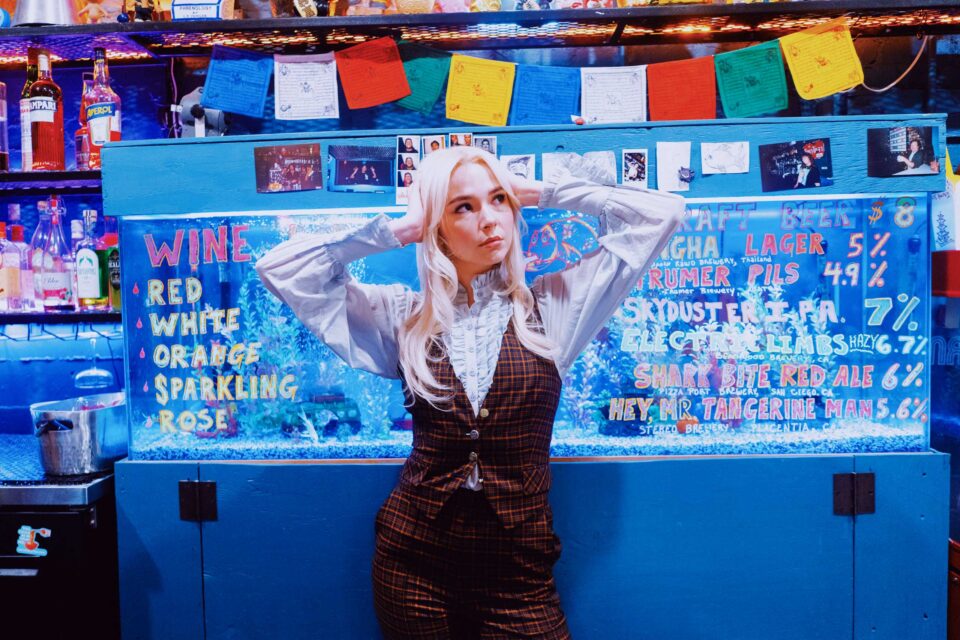
When asked to elaborate, Night admits that her “workaholic” father, while “incredible” and well-meaning, wasn’t always the best influence. “He would always reference people like Kobe Bryant and the most intensely work-obsessed people when I was younger, and this idea that you have to work hard if you want to be the best because someone is always working harder than you. I didn’t realize for a long time that I’d walk into a room so young and have this expectation to be put-together and not show certain sides of myself. To be 15 and on a major label, everyone wants to make money off of you. It’s not like, ‘Oh, we love you as a person, so we want to fund your career.’ It’s a bank that leads to profit for them. So there’s no room for any sort of messiness or vulnerability in that setting, if you want to be taken seriously."
Night stresses, “I don’t think my parents did anything wrong,” and she also doesn’t blame them for what happened when she dated SWMRS drummer Joey Armstrong in 2017 (in 2020, she posted a statement via Instagram claiming Armstrong had sexually abused her during their relationship, when she was 16 and he was 22). “People don’t realize that even if you have the most protective people around you, even if your dad is on tour with you, shit can still happen behind closed doors—and does. It’s just the industry we’re in,” Night says. “And I think that’s a big thing of what happened with me with SWMRS. A lot of people looked at my family and were like, ‘Well, where were your parents?’ But obviously I was lying and manipulating them, because I was being lied to and manipulated. I’m a 16-year-old girl who thinks I’m in love. I think that this is my boyfriend. But I’m being abused. It’s fascinating, and it’s scary. I think about when I have kids, and if they want to do what I do, I don’t know if I’ll let them. Because it’s unsafe.”
“I’ve just realized, you really can make your own rules. And that’s what I’ve really been trying to approach with this record. I’m making my version of what a ‘Lydia Night pop album’ is.”
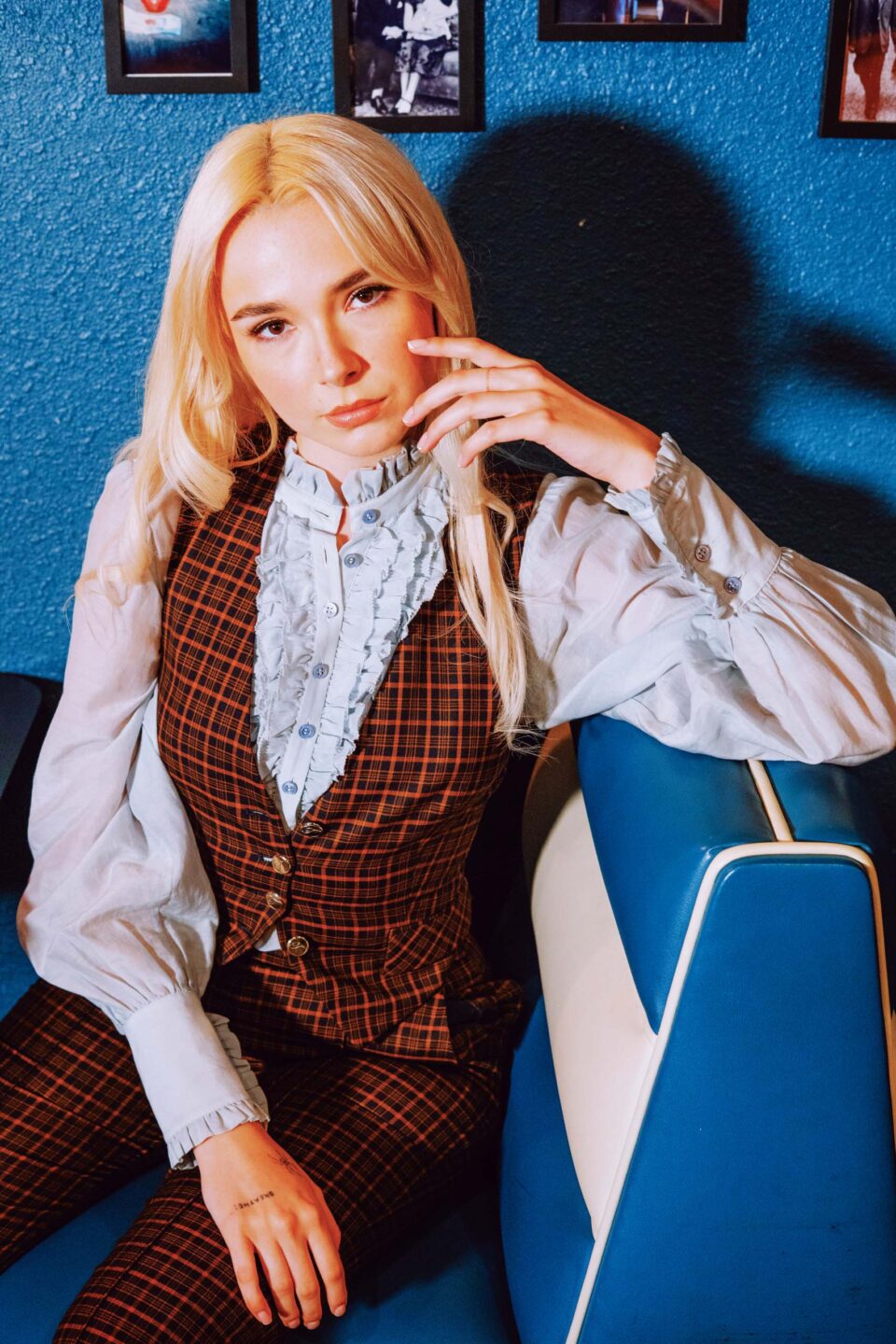
Night admits that that experience, along with her other industry ordeals, made her feel “really fucking weird,” because she’d “get onstage and sing these songs about feminism and feel so empowered in that moment, and then feel so powerless behind closed doors.” She now feels safer and more understood and seen and herself than she ever has on Parody of Pleasure—a sort of concept album “about the existential dread of being an artist” that climaxes with the above-mentioned “Art Sucks” and its key lyric: “Art sucks, but it’s the only thing that’s keeping me alive.”
Yes, some naysaying punk purists may assume that her bold new pop direction is manufactured and manipulated, but as Night stated earlier, her many years in the business have trained her for this big pop-or-flop challenge. “Of course, people still are like, ‘Oh, is her label making her do this?’ And I’m like, ‘Look at the songwriting credits. It’s two people. Me and my producer,’” Night groans, rolling her eyes. “I’ve just realized, you really can make your own rules. And that’s what I’ve really been trying to approach with this record. I’m making my version of what a ‘Lydia Night pop album’ is. And that can be anything I want. If it doesn’t [succeed commercially] that’s fine, because I love what I’m doing, and that’s why I’m doing it. But do I want to play arenas and fucking headline festivals? Yeah, of course I do.” FL


